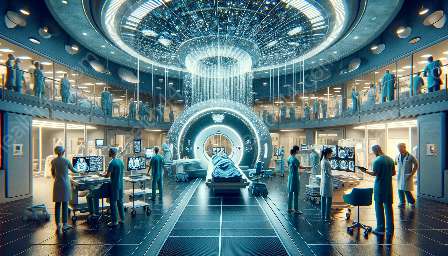MRI technology has undoubtedly revolutionized medical imaging, particularly in the realm of understanding mental health and psychiatric disorders. This advanced imaging technique offers a non-invasive and detailed view of the brain and has significantly contributed to our understanding of various mental health conditions.
Understanding MRI Technology
MRI technology, short for magnetic resonance imaging, makes use of powerful magnets and radio waves to generate detailed images of the internal structures of the human body. In the context of mental health, MRI is employed to visualize the brain's structure, function, and biochemical activity, offering crucial insights into the underlying mechanisms of psychiatric disorders.
Research and Diagnostics
One of the primary roles of MRI technology in studying mental health is facilitating research into various psychiatric disorders. Researchers utilize MRI scans to investigate the differences in brain structure and function between individuals with mental health conditions and those without. These studies have led to significant advancements in the understanding of conditions such as depression, schizophrenia, bipolar disorder, and anxiety disorders.
Moreover, MRI technology plays a crucial role in the diagnosis of psychiatric disorders. By providing detailed images of the brain, clinicians can identify structural abnormalities, such as tumors or lesions, that may be linked to psychiatric symptoms. Additionally, functional MRI (fMRI) allows for the assessment of brain activity, providing insights into the neural processes associated with different mental health conditions.
Advancements in Treatment
The insights gained from MRI technology have also contributed to the development of more targeted and effective treatments for various psychiatric disorders. By understanding the specific brain regions and networks implicated in different conditions, clinicians can tailor treatment approaches to address individual patients' needs. Additionally, MRI technology enables the monitoring of treatment progress and the assessment of how the brain responds to different interventions, aiding in the refinement of therapeutic strategies.
Challenges and Future Directions
While MRI technology has significantly advanced our understanding of mental health and psychiatric disorders, there are challenges that must be addressed. Access to MRI technology can be limited in certain regions, hindering comprehensive research and diagnostic capabilities. Additionally, the interpretation of MRI data requires advanced expertise, and efforts to standardize imaging protocols and analysis techniques are ongoing to ensure consistency and comparability across studies.
Looking ahead, ongoing advancements in MRI technology hold promise for further enhancing our understanding of mental health. Innovations such as functional connectivity MRI and diffusion tensor imaging are expanding the scope of neuroimaging research, allowing for more comprehensive investigations into the neural circuitry involved in psychiatric disorders.
The Future Impact
In conclusion, MRI technology has emerged as a cornerstone in the study of mental health and psychiatric disorders. Its ability to provide detailed and non-invasive insights into the brain's structure and function has transformed our understanding of various conditions and has implications for both research and clinical practice. As MRI technology continues to evolve, its impact on mental health studies is expected to grow, paving the way for more targeted interventions and improved outcomes for individuals coping with psychiatric disorders.



